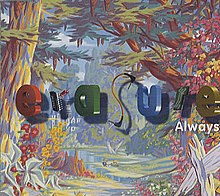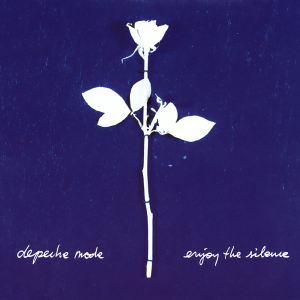
"Enjoy the Silence" is a song by English electronic music band Depeche Mode. Recorded in 1989, it was released as the second single from their seventh studio album, Violator (1990), on 5 February 1990. The single is certified Gold in the US and Germany. The song won Best British Single at the Brit Awards 1991.

"Policy of Truth" is a song by English electronic music band Depeche Mode, released on 7 May 1990 as the third single from their seventh studio album Violator (1990). It is the only Depeche Mode single to chart higher on the U.S. Billboard Hot 100 chart than on the UK Singles Chart, and it became the band's second chart-topper on the Billboard Modern Rock Tracks chart.
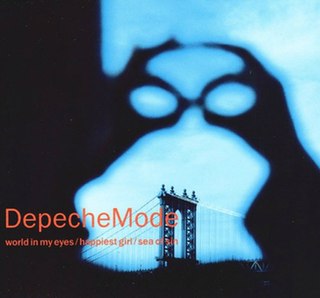
"World in My Eyes" is a song by English electronic music band Depeche Mode. It was released on 17 September 1990 as the fourth and final single from their seventh studio album, Violator (1990). The song peaked at number two in Denmark and Spain, number 17 on the UK Singles Chart, and number 52 on the US Billboard Hot 100.

"Walking in My Shoes" is a song by British electronic music band Depeche Mode. It was released on 26 April 1993 by Mute and Sire as the second single from their eighth studio album, Songs of Faith and Devotion (1993). The song reached number 14 on the UK Singles Chart and matched the success of the previous single "I Feel You" on the US Billboard Modern Rock Tracks chart, where it reached one. The B-side is "My Joy", the only exclusive B-side from the Songs of Faith and Devotion album, and is a rock track in the vein of "I Feel You".

"Condemnation" is a song by English electronic music band Depeche Mode, released on 13 September 1993 by Mute Records as the third single from the band eighth studio album, Songs of Faith and Devotion (1993). The song reached No. 9 on the UK Singles Chart, No. 3 in Sweden, and No. 1 in Portugal. Its music video was directed by Anton Corbijn.
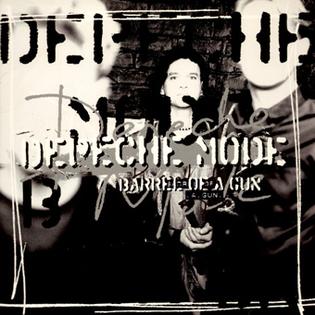
"Barrel of a Gun" is a song by English electronic music band Depeche Mode, released as the first single from their ninth studio album, Ultra (1997), on 3 February 1997. The song reached number one in the Czech Republic, Hungary, Spain and Sweden while reaching the top 10 in several other countries, including Finland, Germany, Norway and the United Kingdom. In North America, the song reached number 47 on the US Billboard Hot 100 and number three on the Canadian Singles Chart.

"It's No Good" a song by English electronic music band Depeche Mode, released on 31 March 1997 as the second single from their ninth studio album, Ultra (1997). It was commercially successful, reaching number one in Denmark, Spain, Sweden and on the US Billboard Hot Dance Club Play chart. It entered the top 10 in Finland, Germany, Iceland, Italy, and the United Kingdom, where it peaked at number five.

"Only When I Lose Myself" is a song by English electronic music band Depeche Mode. It was made exclusively for their 1998 compilation The Singles 86>98 and released as a single on 7 September 1998. It is the first non-album studio single since "It's Called a Heart" in 1985 and is also one of the rare singles to have two limited editions.

"Dream On" is a song by English electronic music band Depeche Mode. It was released in the United States on 17 April 2001 and in the United Kingdom on 23 April 2001 as the first single from the band's tenth studio album, Exciter (2001). The song topped the charts of Denmark, Germany, Italy and Spain and reached the top 10 in Austria, Canada, Finland, Norway, Portugal, Sweden, the United Kingdom and Wallonia. The song's music video was directed by Stéphane Sednaoui.
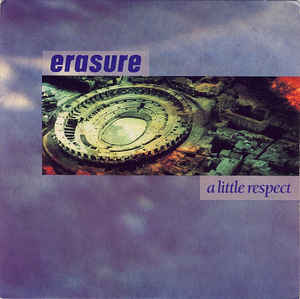
"A Little Respect" is a song written and recorded by British synth-pop duo Erasure, released in September 1988 by Mute. It was written by Vince Clarke and Andy Bell. The lyrics are a plea to a lover to show compassion and respect. The heavily synthesized instrumentation is accentuated by acoustic guitar and Bell's vocal falsetto in the chorus. It was their tenth single and was taken from their third studio album, The Innocents (1988). Known as one of their signature songs, the single reached number four on the UK Singles Chart and was Erasure's second consecutive top-20 hit on the US Billboard Hot 100, where it made number 14, and reached number two on the US Billboard Dance Club Play chart.

"Drama!" is the first single released from English synth-pop duo Erasure's fourth studio album, Wild! (1989). Written by Vince Clarke and Andy Bell, the song begins with a low-key keyboard line and a subdued vocal from Bell. As the song progresses, the instrumentation and vocals become more hectic, ultimately ending as a full-blown dance track. "Drama!" contains a "Guilty!" exclamation throughout, provided by Scottish band the Jesus and Mary Chain, who were recording in the studio next door. The song was met with critical acclaim from both music critics and fans.

"Blue Savannah" is a song by English synth-pop duo Erasure from their fourth studio album, Wild! (1989). Written by members Vince Clarke and Andy Bell, the song was released as a single in Japan on 25 January 1990 and was issued in the United Kingdom the following month. Alfa Records released it in Japan as the album's lead single, Mute Records released it in Europe as the album's third single, and Sire Records released it in the United States as the album's second single. Considered one of the band's signature songs, the duo still perform it regularly in concerts. It has been described as an uplifting love song; the instrumentation is crisp and heavily synthesized, accented with sweeping, programmed piano.

"Chorus" is a song by English synth-pop duo Erasure, released in June 1991 as the first single from their fifth studio album of the same name (1991). Produced by Martyn Phillips and written by Erasure members Vince Clarke and Andy Bell, the song features Clarke's electronic soundscapes and Phillips' computerised production. The single was released by Mute Records in the United Kingdom and Sire Records in the United States. It peaked at number three in both Denmark and the UK while reaching number four in Ireland. In the US, it peaked at number 83 on the Billboard Hot 100 and number four on the Billboard Modern Rock Tracks chart.

"Love to Hate You" is a song by English synth-pop duo Erasure, released in September 1991 as the second single from their fifth studio album, Chorus (1991). Written by band members Vince Clarke and Andy Bell, it is an electronic dance track inspired by disco music. The synthesizer melody in the chorus is an interpolation of the string break from American singer Gloria Gaynor's disco-era classic "I Will Survive". The duo also recorded a Spanish version of the song, called "Amor y Odio", and one in Italian called "Amo Odiarti". The single was released by Mute Records in the UK and Sire Records in the US. It peaked at number four on the UK Singles Chart and became a top-10 hit in Austria, Denmark, Finland, Greece, Ireland, and Sweden. Its music video was directed by David Mallet.

"Breath of Life" is a song by English synth-pop duo Erasure, released as the fourth and final single from their fifth studio album, Chorus (1991), in March 1992. It was written by Erasure members Vince Clarke and Andy Bell with additional input from Pat O'Brien. An uptempo synth-pop song, its dance music elements were strongly accentuated for the club remixes. For the single release, it was remixed slightly, including a shortened intro. In the United States, it was the third single released from the album.

"Run to the Sun" is a song by English synth-pop duo Erasure, released in July 1994 by Mute and Elektra as the second single from the duo's sixth studio album, I Say I Say I Say (1994). The song is written by Vince Clarke with fellow Erasure member Andy Bell and is an uptempo dance music track that displays signature synthesizer programming by Clarke. The UK 7-inch single of "Run to the Sun" was issued on yellow-coloured vinyl and featured a fold-out poster of the single's cover artwork. The single's B-side, a ballad entitled "Tenderest Moments", was later re-recorded by Erasure in an acoustic version for their 2006 album Union Street.

"I Love Saturday" is a song by English synth-pop duo Erasure, released as the third single from their sixth studio album, I Say I Say I Say (1994), on 18 November 1994 in Japan. The track was written by Vince Clarke and Andy Bell, and produced by Martyn Ware. In the United Kingdom, Mute credited the first CD single as the I Love Saturday EP, which contains several new tracks; it was released on 21 November 1994.

"Breathe" is a song by English synth-pop duo Erasure. It was released by Mute Records in the UK and the US as the first single from the band's 11th studio album, Nightbird (2005). Written and produced by Erasure members Vince Clarke and Andy Bell, the song was remixed slightly for its radio version. The UK CD single includes CD-ROM information that allowed buyers to download the Digipro software package and use isolated musical tracks of "Breathe" to create their own remixes. For a short time, fans were able to upload their finished "Breathe" remixes to Erasure's website to share with others.

"We Are All Made of Stars" is a song by American electronica musician Moby. It was released as the first single from his sixth studio album, 18 (2002), on April 1, 2002. It reached number 11 on the UK Singles Chart and became a top-10 hit in several other European countries.
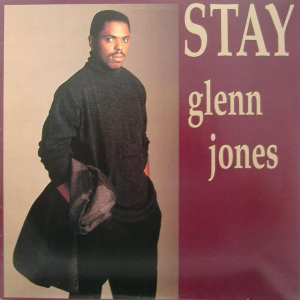
"Stay" is a song written by Bob Khozouri and Mark Stevens, and originally recorded by American singer Glenn Jones. It was released in 1990 by Jive Records from his fifth album, All for You (1990), reaching number six on the US Billboard Hot Black Singles chart. The song became a worldwide hit for British girl group Eternal in 1993 and 1994.
